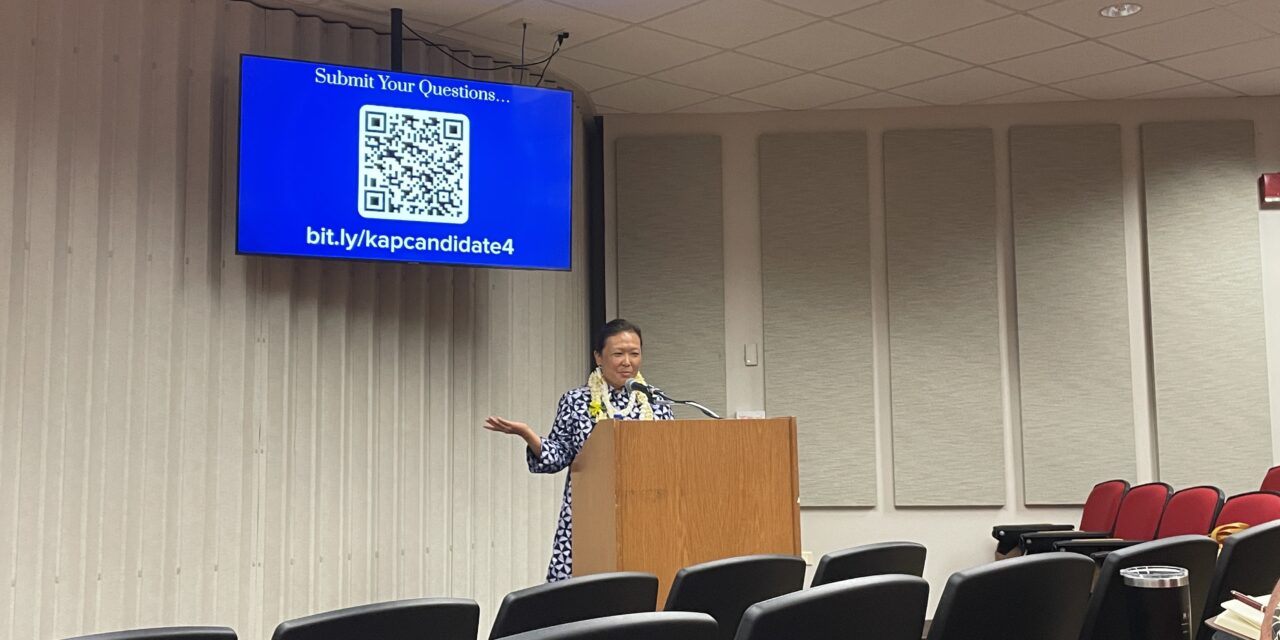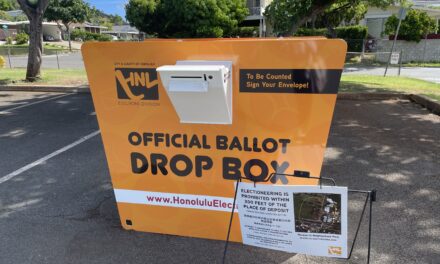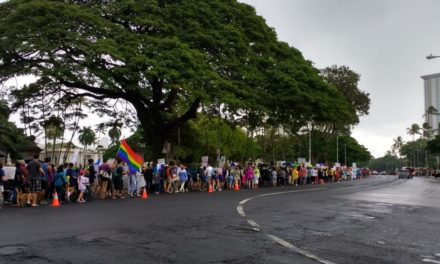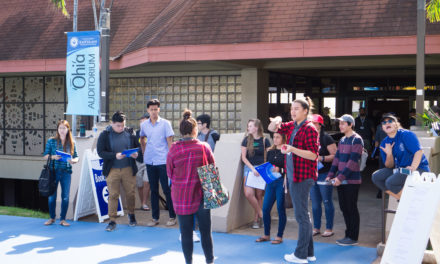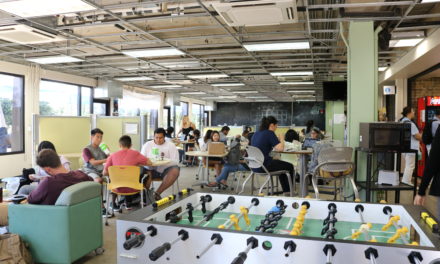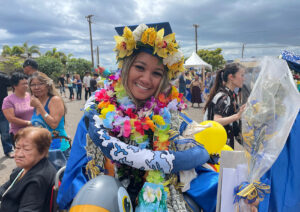Chancellor candidate Misaki Takabayashi shared her diverse background and experiences that she believes make her ideal to be the next chancellor at KCC. (Photo by Cameron Enomoto)
By Cameron Enomoto | Staff Writer
With Chancellor Louise Pagotto retiring at the end of this year, the search for a new Kapiʻolani Community College chancellor has found four finalists that will be considered for the position. On Thursday, all four candidates participated separately in an open forum held in ʻŌhiʻa 118 where they were able to share their backgrounds and answer questions from the audience. Each candidate was given an hour to speak, and the forum was open to the public. Videos of each candidate will be available on the KCC late on Friday.
Karen Lee: As the current interim chancellor at Honolulu Community College, and also a finalist for the chancellor position there, Lee has more than 29 years of higher education experience. She holds a Doctorate of Education in education leadership administration from the University of Southern California, a Master of Arts in higher education administration, and a Bachelor of Arts in mathematics from Columbia University in New York.
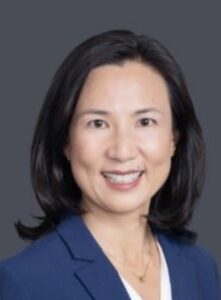
Karen Lee is the current interim chancellor at HCC. (Photo courtesy of KCC)
Lee identifies as being originally from Hawaiʻi despite being born in New Zealand. She completed elementary school in Hawaiʻi and moved to Cameroon for middle school before coming back to the United States for college. In her previous work experience Lee shared that while she has not been an instructional faculty member, she has given multiple presentations and talks in the classroom.
Her leadership philosophy and style are focused on advocating for professional development and positive morale in order to establish a unified vision and path forward.
“Establishing a listening ear and a culture on campus is important to understand and maintain,” said Lee. “I would make an effort to meet groups on campus, encourage honesty among staff, and provide platforms for students to share experiences as well.”
In the process of adjusting to life with Covid, Lee has stressed the importance of offering high-quality online instruction to students. Additionally, the increase in online presence has provided the opportunity for counselors to hold one-on-one sessions and open office hours for students to join if needed.
“It’s important to offer a greater amount of resources to our students,” said Lee. “It’s our responsibility to provide the best education possible for our students.”
In response to being asked why she applied for the chancellor position, Lee said, “I have never worked at KCC, but I know a lot of people who have gone here, I know a number of you who work here, and KCC is such a special place. I think for any of us who are finalists, it would be an honor to work here, to contribute here, and to add in some small way, shape, or form to the great work that is already being done here.”
Charles Sasaki: Sasaki is currently the vice chancellor for academic affairs at Windward Community College and has over 28 years of higher education experience. He has completed doctoral coursework in American studies at the University of Hawaiʻi at Mānoa. Additionally, Sasaki holds a Master of Arts in comparative culture from the University of California, Irvine and a Bachelor of Arts in history from the University of California, Riverside.
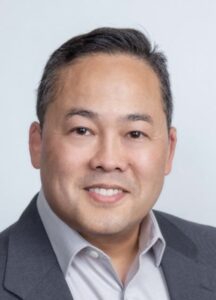
Charles Sasaki is the current vice chancellor for academic affairs at WCC. (Photo courtesy of KCC)
Sasaki’s family has been in Hawaiʻi for six generations and were originally immigrants from Japan. Sasaki was born in California and had been living there until moving to Hawaiʻi in 2001. He has worked as the associate vice president of Student Affairs at Hawaiʻi Pacific University and was the dean of Arts and Sciences over transfer programs at KCC. Additionally, Sasaki was a professor of ethnic studies and has experience in the classroom.
He said his leadership is based on humility and authenticity, and he emphasized that as a leader you cannot work with other people unless they can understand something about you.
“I’m very focused on team-building, on getting people on board, which means then that I use vulnerability and a willingness to get people to know me,” said Sasaki. “I am who I am. It’s best to let people know who I am so we can best figure out how to work as a team.”
Sasaki said he viewed Covid as an experience that helped people to focus on health, being well, and being safe in addition to adjusting to change.
“Writing policies to help students withdraw late and changing the contract with the union so that people could submit their tenure dossier late without any penalty to them was the right move,” Sasaki said. “We pulled them off, and we did it really well. That is an innovation that I think can be carried forward because I now know that the flexibility is there. It is actually possible to do these things.”
Kendricks Hooker: With over 20 years of higher education experience, Hooker is the current vice president of Academic Affairs at Southwest Tennessee Community College. He holds a Doctorate of Philosophy in urban higher education from Jackson State University in Mississippi, a Master of Business Administration from Bethel University in Tennessee, a Master of Science and Bachelor of Science in biology from Jackson State University, and an Associate of Arts in biology from Coahoma Community College in Mississippi.
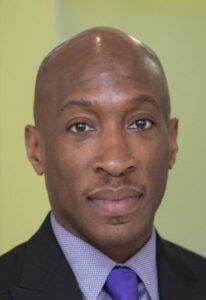
Kendricks Hooker is the current vice president of academic affairs at Southwest Tennessee CC. (Photo courtesy of KCC)
Hooker is a former professor and said that it’s important to embrace challenges with integrity.
His motto in an executive leadership role is, “To make sure that our marketing premise to our students reflects their academic journey.”
“We typically get students to come to our space, we get students to sit in that seat, and we promised them something,” Hooker said. “So now it’s important for us to make sure that their academic journey is exactly what we promised them.”
As someone who is not from Hawaiʻi, Hooker said he believes that it is important for him to embrace the culture and learn more about it.
“This is my first time in Hawaiʻi, and I’m very excited,” said Hooker. “I certainly know that I have transferable skills to work with any population, students, faculty, staff, and uphold their traditions and become a part of that.”
He said that his leadership is participatory. Hooker stated that he has no problem rolling up his sleeves and becoming a part of what is going on.
“I think that collaboration and having thought partners across the institution is important,” said Hooker. “I think inclusion and feedback from many voices is so critical. At the same time, I believe that being chancellor speaks to my ability of being a transformative leader as well.”
Misaki Takabayashi: Currently the associate vice president of graduate school at the Okinawa Institute of Science and Technology Graduate University in Japan, Takabayashi has more than 20 years of higher education experience with a Doctorate of Philosophy in marine science from the University of Queensland in Australia, a Master of Science in biology and Bachelor of Science in biology from the University of Sydney in Australia, and an Associate of Applied Science in Hawaiian studies from Hawaiʻi Community College.
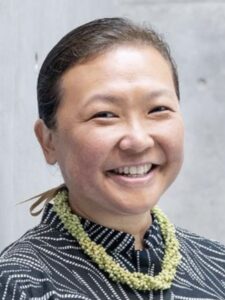
Misaki Takabayashi is the current associate vice president of Okinawa Institute of Science and Technology Graduate University. (Photo courtesy of KCC)
Born in Japan, Takabayashi grew up in Australia and has taught at the University of Hawaiʻi at Hilo.
“I bring to the table a unique combination of being firmly grounded in Hawaiʻi, but with perspectives, experiences, and opportunities from places you might consider to be from beyond the horizon,” said Takabayashi. “I come from where you send your graduates to. I had lots of students at UH Hilo who came from Kapiʻolani Community College. I know of what you do at Kapiʻolani with your students that prepared them to succeed, and so they did.”
Additionally, Takabayashi stated that Asia and the Pacific continue to look to Hawaiʻi as the destination for quality education embedded in life experiences. She believes that she comes with relationships and the ability to attract new industry partners in state, nationally, and globally.
“When you can see beyond the horizon, the world gets bigger,” said Takabayashi. “The sky lights up, and you can see opportunities that you couldn’t see before. I want to see Kapiʻolani in the next phase where we’re truly rooted to Oʻahu and with clear focus on our student success outcomes beyond our campus horizons.”
Takabayashi’s vision for KCC is structured upon combining and creating different approaches that pull from multiple strengths.
“What about trialing toward food sovereignty through Culinary Arts or combining sustainability sciences into Tourism and taking an interdisciplinary approach to support that important industry [tourism] for Hawaiʻi,” said Takabayashi. “We cannot think linearly anymore. We need to be continuously investing, always, into the next generation.”
Each of the candidates discussed other topics like student life, mental health, fundraising, and the importance of being an indigenous-serving institution. Recordings of the final interviews and a link to the feedback form will be available late Friday and will be posted through Tuesday, Oct. 18, at noon. Visit the KCC Chancellor Search site for more information regarding candidates and additional feedback.
Associate professor Kristie Malterre, one of the appointed search coordinators, said that Erika Lacro, the University of Hawaiʻi vice president for community colleges, will submit a final candidate to President David Lassner for approval. The final candidate is expected to be submitted sometime in November, and the new chancellor is expected to begin no later than Jan. 2, 2023.

